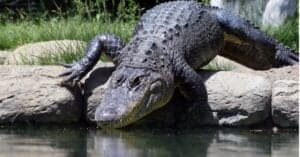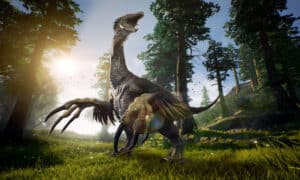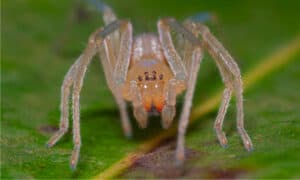The Oldest Birds Of All Time (One reached 120 Years Old!)
Talking about age is taboo in some circles. When we talk about the age of a bird, it is a little more complex than you might think. Birds don’t show their age in the way one might expect. They don’t get grey hairs, arthritis, or other tell-tale signs of age. Let’s dive into how biologists determine the age of birds and examine the oldest birds of all time.
First: Let’s Talk about Bird Banding and Birds in Captivity
What we do know about the age of birds comes from bird banding. The banding on a bird allows us to track the age of a bird when they are spotted at a later time. The problem is that we might not know the age of the bird at the time of banding. It is also unlikely to locate a banded bird so they are hard to track. The result is a near impossibility to determining the age of a bird.
One theory has to do with the way birds process oxygen and the proteins associated with metabolism. It is also known that bird enthusiasts have exaggerated the age of birds they have knowledge about much as we exaggerate about many great accomplishments.
There are also differences between birds in captivity and birds in the wild. Food sources, elements, predators all play a role in the lifespan. There is almost no way to track the lifespan of birds in the wild.
The best we can do is to watch for cues to give an educated guess.
- Larger birds tend to live longer than smaller bird breeds
- Older birds will have fewer chicks
- It takes longer-living species more time to reach adulthood
- Birds that nest in treetops tend to live longer than those that nest on the ground
- Island dwelling birds tend to live longer
Here are some of the oldest birds we have on record.
Below you’ll find a list of many of the oldest birds of all time. Since many ages are estimates, it’s hard to prove precisely how old the oldest birds are, but several in captivity reach ages as long as the oldest humans!
#8: Eagle 629-03142 the Bald Eagle
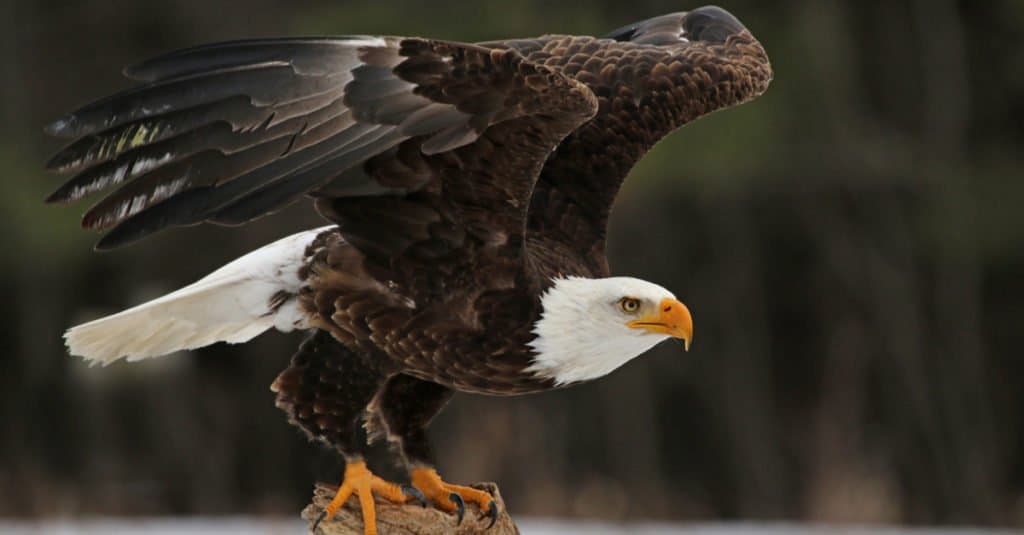
Chris Hill/Shutterstock.com
The oldest bald eagle on record reached an age of 38 years. Bald eagles have made a stunning recovery since their populations hit just 417 breeding pairs in 1963. Today, it’s estimated that more than 300,000 bald eagles are alive.
The oldest known bald eagle was struck by a car in 2012. It had been born and tracked since its birth in 1977. With bald eagles living to an average age of closer to 20 years, this was a remarkably long life for the species.
#7: Chile the Flamingo
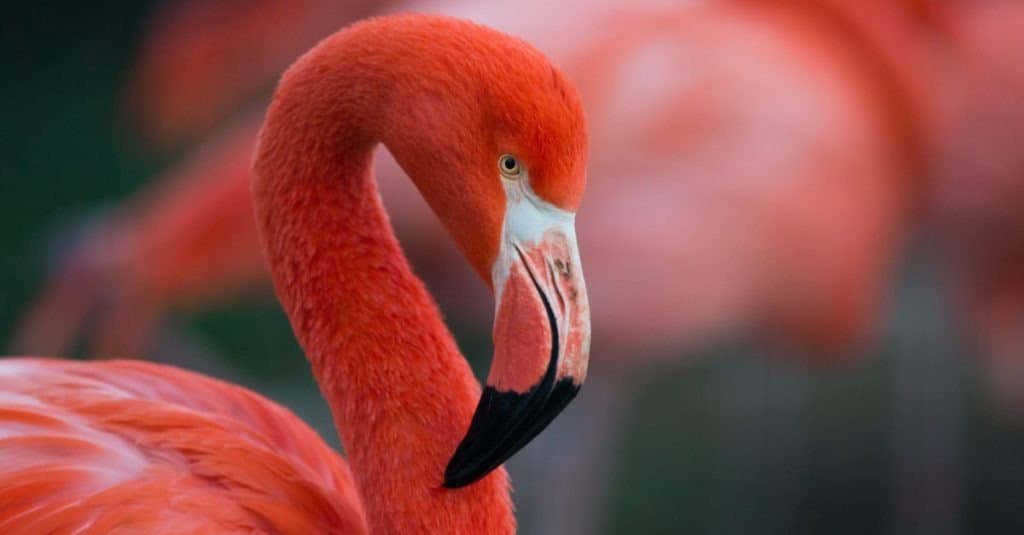
Mrinal Pal/Shutterstock.com
Australia is the home of Chile, a female Chilean flamingo. While the exact age is not known for certain, the best guess is that Chile was in her 60s when she died in 2018. She was in a zoo from the 1970s until she died.
The Chilean Flamingo species numbers around 300,000 and will live 40-50 years on average. They can run up to speeds of 59 km/h. Native to South America, this beautiful pink bird can be found in Germany, the Netherlands, Utah, and California. They prefer to spend their time in brackish alkaline lakes.
During day hours, the flamingo spends up to 30% of its time preening to make sure its feathers are waterproofed and in good condition to fly. They are sociable birds and will gather in numbers from a few to tens of thousands when they nest and feed. To stay together during the flight they will call each other.
You might wonder why they often stand on one leg. They do this to conserve body heat. They will also tuck their head under one wing for warmth.
The flamingo will lay only one egg at a time and both parents will incubate the egg for about 3-4 weeks. When the baby flamingos are 5-8 days old they will gather in groups called a créche of up to 30,000 other adolescents. When it is time for feeding, their parents will call them with an individual call for their offspring. After 2 ½ to 3 months, the offspring will be self-sufficient and can then leave the créche.
#6: Wisdom the Albatross
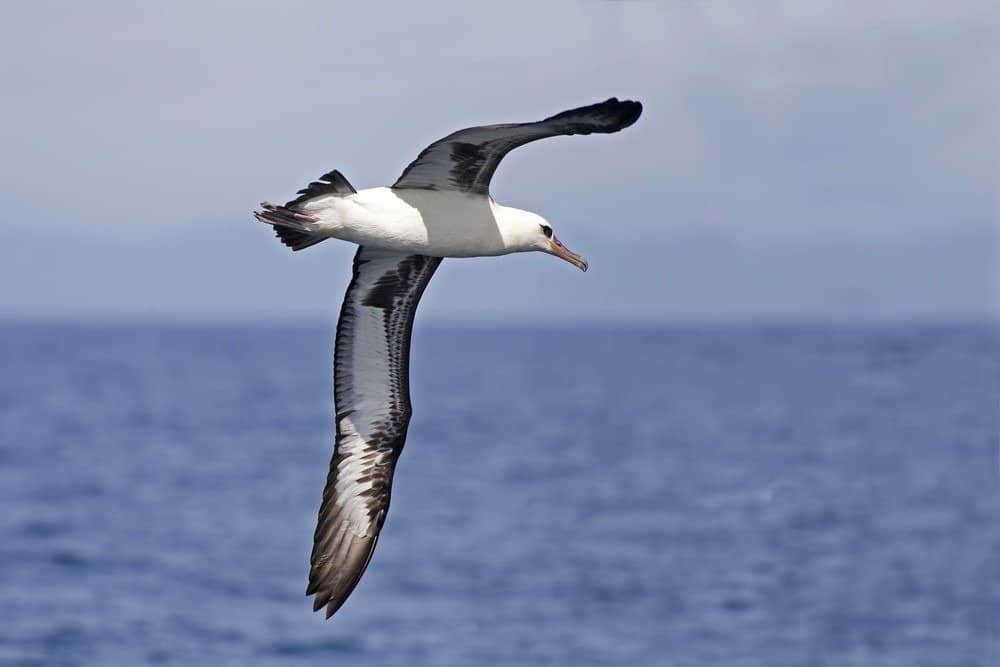
Harold Stiver/Shutterstock.com
Wisdom is a female Laysan albatross. She is now 69 years old, having been banded and left in the wild in 1956. It was estimated that she was 6 years old when banded. Wisdom lives on the Midway Atoll National Wildlife Refuge near Hawaii. The albatross will spend most of its time soaring over the ocean. It rarely goes to land and does so mainly for nesting.
Wisdom is still laying eggs, and had one when she was 67 and again at 68! An impressive nearly 80-inch wingspan, this seabird is mostly white on the underside, and dark brown to black on the upper side. The albatross rarely flaps its wings. Instead, it will use the wind to glide and airflow patterns to gain height. Feeding occurs mostly at night where they will sit on the water’s surface and catch their prey as it comes close to the surface of the water.
It is estimated that there are close to 600,000 breeding pairs of the Laysan albatross birds in existence. Both parents will incubate the single egg for 64-65 days before it hatches. Once the egg hatches parents will take turns foraging for food to bring back to the hatchling for 12-24 days. They do this by regurgitating the food for the baby albatross to then eat. After roughly 165 days the young albatross is ready to leave the nest.
#5: Thaao the Andean Condor
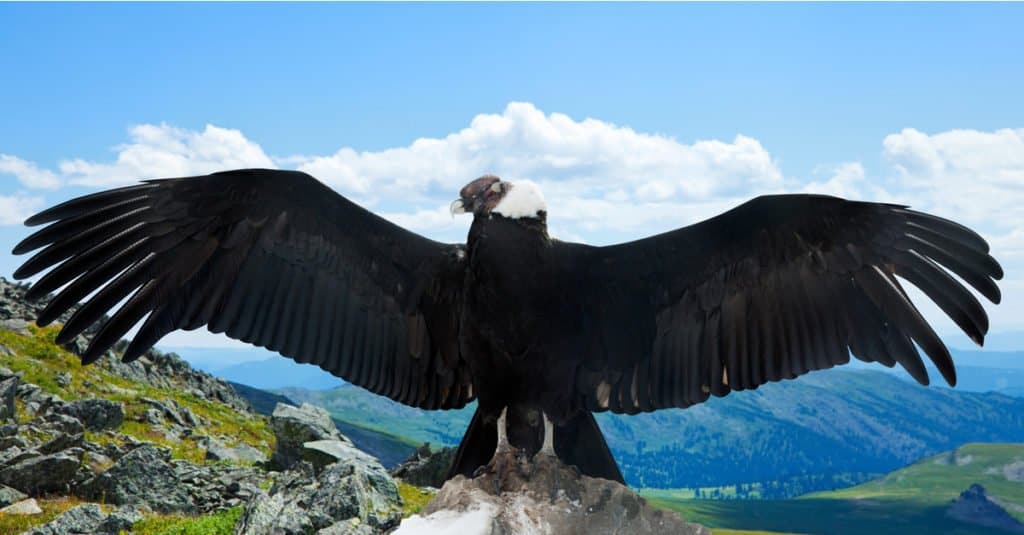
BearFotos/Shutterstock.com
Thaao was an 80-year-old male Andean condor who lived in Bridgeport, Connecticut. He died in 2010. He was part of the earliest tracking history we have on birds. Thaao was born in the wild and joined the Beardsley Zoo in 1993.
The average Andean Condor doesn’t live past 47 years old. It takes them six to eight years to reach maturity. The mature condor lays one egg every two years but if the egg is lost, it may lay a second one in four to six weeks. The incubation period is just shy of two months. Both parents will take part in the first year of life for the young condor.
Communication for the Andean condor is made up of clicks, hissing and grunts. They do not have a syrinx, which would allow them to vocalize. As the largest raptor and largest flying bird in South America, this condor is a scavenger and eats it prey after it is already dead. They are resistant to harmful bacterias that they may encounter in the rotting flesh.
#4: Greater the Greater Flamingo
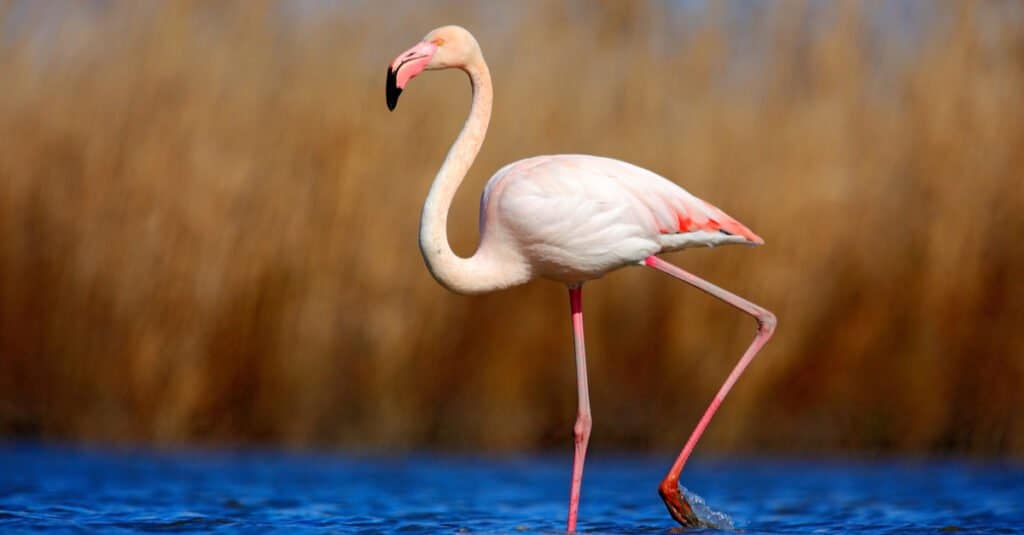
Greater was a greater flamingo that lived at least 83 years, living until 2014 at the Adelaide Zoo in Australia. A near escape from death in 2008, Greater was attacked by a group of young men and teenage boys while at the zoo. He lived another six years before he died of advanced age.
Of the six flamingo species, the greater flamingo is the most common. They are also the largest of the flamingo species. Its large size gives the greater flamingo the ability to wade into deeper waters than its relatives. When they flock together, it is called a stand or colony. A colony will have from 10-12 up to 20,000 birds although there have been sightings of 200,000 in a colony.
The greater flamingo is a social bird with a goose-like honking sound. It is louder when they are courting and quieter when feeding. The flamingos will build their nest as a pair, working together. They keep their nest almost five feet away from other nests to protect their young. The partners will stay together for life once they decide upon their mate.
The single egg hatches after 27-31 days, having had both parents help incubate it. The parents will feed the young chick a creamy pink liquid called crop milk for three to four weeks. At 10 weeks of age, the young will fledge, but continue to live in a group called a creche for another month. They are considered fully grown at two years old and can take a mate at three years of age.
#3: Cookie the Major Mitchell’s Cockatoo
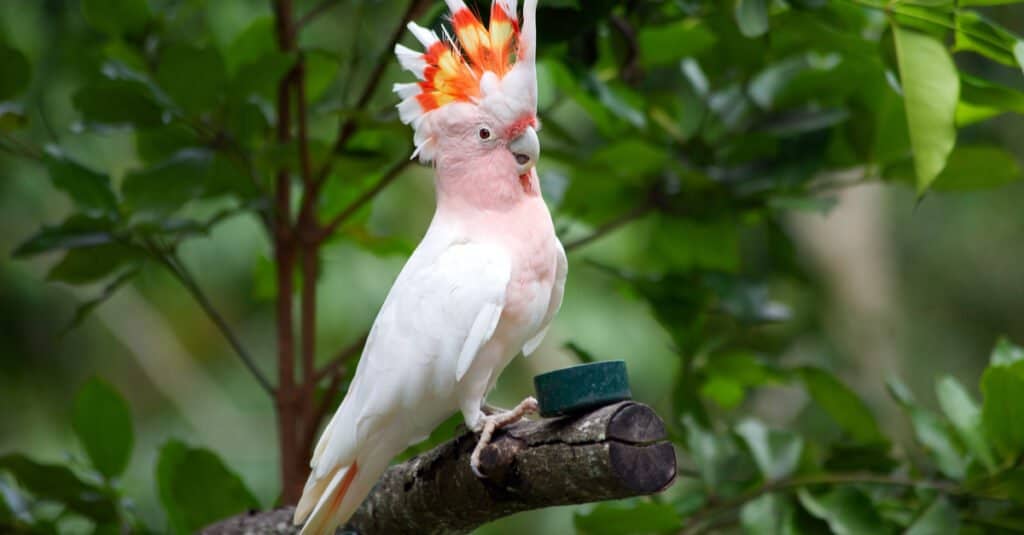
Tanya Puntti/Shutterstock.com
Several macaw and parrot species reach advanced ages, however it’s a Major Mitchell’s cockatoo that Guinness Book of World Records recognizes as the oldest.
Cookie was a male Major Mitchell’s cockatoo. He lived to be 83 years old, dying in 2016 at his home in the Brookfield Zoo, Chicago, Illinois. He has a known birthdate of June 30, 1933, and lived until August 27, 2016. Cookie was so beloved that he received gifts, letters, and cards from people around the world.
The Major Mitchell’s cockatoo lives in pairs, near the water. A high-maintenance socialite, this cockatoo likes to interact with its owner or caregivers but not other cockatoos of its species. They bond to their human keepers and become very temperamental when their human is not around.
The bird will show signs of being jealous when their humans pay attention to others more than it. They have been known to nip at the person taking attention away from them. They can be taught tricks like dancing, they whistle or mimic words. If their humans are away for a long period, such as a vacation, they may display forms of self-mutilation as they feel neglected.
#2: Fred the Cockatoo
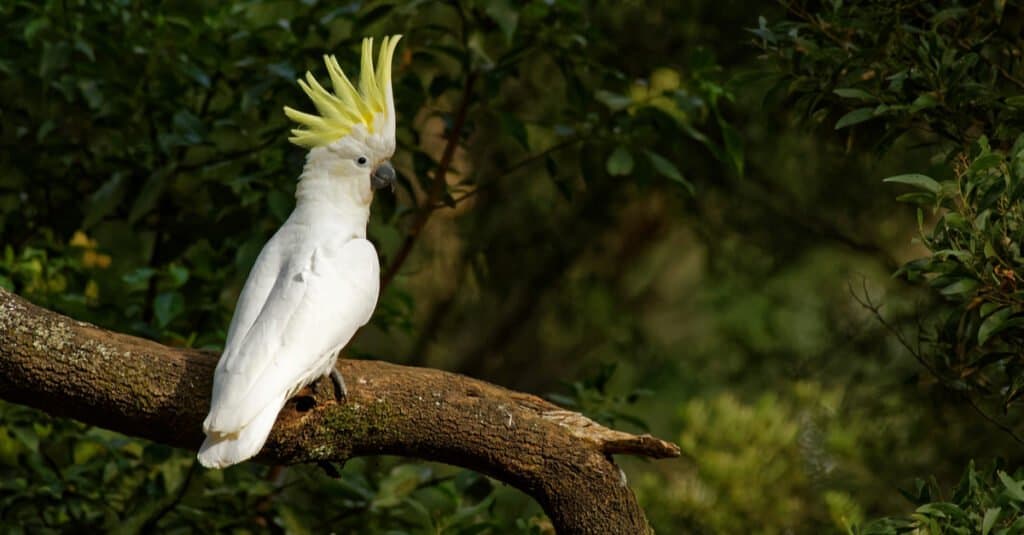
Martin Pelanek/Shutterstock.com
Sulpher-crested cockatoos can live very long lives (just check out #1 on our list!), and Fred the cockatoo is believed to be 106 years old!
On November 1, 2014 Fred celebrated his 100th birthday in style. The cockatoo, who lives in the Bonogrong Wildlife Sanctuary in Tasmania, received a birthday cake from none other than the queen of England! While staff celebrated Fred’s birthday, his precise age isn’t known as he had lived in captivity in several locations across his life.
With Fred still thrilling visitors to the Bonorong Wildlife Sanctuary as of late 2020, the cockatoo has now reached 106 years of age. So if Fred manages to make it to 2034 he could dethrone the oldest bird on our list!
#1 Cocky Bennett the Cockatoo
With a reported lifespan of 120 years, Cocky Bennett was the oldest bird of all time. Reportedly living from 1796 – 1916, this male Sulpher-crested cockatoo is reported as the longest living cockatoo. A beloved pet, Cocky Bennett’s owner even had an obituary printed when he died.
Cocky Bennett traveled the world many times with his owner, Captain Ellis on their ship. After the owner died, Cocky was passed on to Ellis’ nephew. Cocky Bennett changed hands a few times, settling in with hotel keepers. Cocky became known as the “Cock of the bar”, and was regularly serving up entertainment with his phrases.
When Cocky finally died, he was featherless. He had been dropping his feathers and lost his last feathers twenty years before his death. Cocky Bennett had many friends he made in his life, and his life story is fondly remembered and retold through his stories.
More from A-Z Animals
Talking about age is taboo in some circles. When we talk about the age of a bird, it is a little more complex than you might think. Birds don’t show their age in the way one might expect. They don’t get grey hairs, arthritis, or other tell-tale signs of age. Let’s dive into how biologists determine the age of birds and examine the oldest birds of all time.
First: Let’s Talk about Bird Banding and Birds in Captivity
What we do know about the age of birds comes from bird banding. The banding on a bird allows us to track the age of a bird when they are spotted at a later time. The problem is that we might not know the age of the bird at the time of banding. It is also unlikely to locate a banded bird so they are hard to track. The result is a near impossibility to determining the age of a bird.
One theory has to do with the way birds process oxygen and the proteins associated with metabolism. It is also known that bird enthusiasts have exaggerated the age of birds they have knowledge about much as we exaggerate about many great accomplishments.
There are also differences between birds in captivity and birds in the wild. Food sources, elements, predators all play a role in the lifespan. There is almost no way to track the lifespan of birds in the wild.
The best we can do is to watch for cues to give an educated guess.
- Larger birds tend to live longer than smaller bird breeds
- Older birds will have fewer chicks
- It takes longer-living species more time to reach adulthood
- Birds that nest in treetops tend to live longer than those that nest on the ground
- Island dwelling birds tend to live longer
Here are some of the oldest birds we have on record.
Below you’ll find a list of many of the oldest birds of all time. Since many ages are estimates, it’s hard to prove precisely how old the oldest birds are, but several in captivity reach ages as long as the oldest humans!
#8: Eagle 629-03142 the Bald Eagle

Chris Hill/Shutterstock.com
The oldest bald eagle on record reached an age of 38 years. Bald eagles have made a stunning recovery since their populations hit just 417 breeding pairs in 1963. Today, it’s estimated that more than 300,000 bald eagles are alive.
The oldest known bald eagle was struck by a car in 2012. It had been born and tracked since its birth in 1977. With bald eagles living to an average age of closer to 20 years, this was a remarkably long life for the species.
#7: Chile the Flamingo

Mrinal Pal/Shutterstock.com
Australia is the home of Chile, a female Chilean flamingo. While the exact age is not known for certain, the best guess is that Chile was in her 60s when she died in 2018. She was in a zoo from the 1970s until she died.
The Chilean Flamingo species numbers around 300,000 and will live 40-50 years on average. They can run up to speeds of 59 km/h. Native to South America, this beautiful pink bird can be found in Germany, the Netherlands, Utah, and California. They prefer to spend their time in brackish alkaline lakes.
During day hours, the flamingo spends up to 30% of its time preening to make sure its feathers are waterproofed and in good condition to fly. They are sociable birds and will gather in numbers from a few to tens of thousands when they nest and feed. To stay together during the flight they will call each other.
You might wonder why they often stand on one leg. They do this to conserve body heat. They will also tuck their head under one wing for warmth.
The flamingo will lay only one egg at a time and both parents will incubate the egg for about 3-4 weeks. When the baby flamingos are 5-8 days old they will gather in groups called a créche of up to 30,000 other adolescents. When it is time for feeding, their parents will call them with an individual call for their offspring. After 2 ½ to 3 months, the offspring will be self-sufficient and can then leave the créche.
#6: Wisdom the Albatross

Harold Stiver/Shutterstock.com
Wisdom is a female Laysan albatross. She is now 69 years old, having been banded and left in the wild in 1956. It was estimated that she was 6 years old when banded. Wisdom lives on the Midway Atoll National Wildlife Refuge near Hawaii. The albatross will spend most of its time soaring over the ocean. It rarely goes to land and does so mainly for nesting.
Wisdom is still laying eggs, and had one when she was 67 and again at 68! An impressive nearly 80-inch wingspan, this seabird is mostly white on the underside, and dark brown to black on the upper side. The albatross rarely flaps its wings. Instead, it will use the wind to glide and airflow patterns to gain height. Feeding occurs mostly at night where they will sit on the water’s surface and catch their prey as it comes close to the surface of the water.
It is estimated that there are close to 600,000 breeding pairs of the Laysan albatross birds in existence. Both parents will incubate the single egg for 64-65 days before it hatches. Once the egg hatches parents will take turns foraging for food to bring back to the hatchling for 12-24 days. They do this by regurgitating the food for the baby albatross to then eat. After roughly 165 days the young albatross is ready to leave the nest.
#5: Thaao the Andean Condor

BearFotos/Shutterstock.com
Thaao was an 80-year-old male Andean condor who lived in Bridgeport, Connecticut. He died in 2010. He was part of the earliest tracking history we have on birds. Thaao was born in the wild and joined the Beardsley Zoo in 1993.
The average Andean Condor doesn’t live past 47 years old. It takes them six to eight years to reach maturity. The mature condor lays one egg every two years but if the egg is lost, it may lay a second one in four to six weeks. The incubation period is just shy of two months. Both parents will take part in the first year of life for the young condor.
Communication for the Andean condor is made up of clicks, hissing and grunts. They do not have a syrinx, which would allow them to vocalize. As the largest raptor and largest flying bird in South America, this condor is a scavenger and eats it prey after it is already dead. They are resistant to harmful bacterias that they may encounter in the rotting flesh.
#4: Greater the Greater Flamingo

Greater was a greater flamingo that lived at least 83 years, living until 2014 at the Adelaide Zoo in Australia. A near escape from death in 2008, Greater was attacked by a group of young men and teenage boys while at the zoo. He lived another six years before he died of advanced age.
Of the six flamingo species, the greater flamingo is the most common. They are also the largest of the flamingo species. Its large size gives the greater flamingo the ability to wade into deeper waters than its relatives. When they flock together, it is called a stand or colony. A colony will have from 10-12 up to 20,000 birds although there have been sightings of 200,000 in a colony.
The greater flamingo is a social bird with a goose-like honking sound. It is louder when they are courting and quieter when feeding. The flamingos will build their nest as a pair, working together. They keep their nest almost five feet away from other nests to protect their young. The partners will stay together for life once they decide upon their mate.
The single egg hatches after 27-31 days, having had both parents help incubate it. The parents will feed the young chick a creamy pink liquid called crop milk for three to four weeks. At 10 weeks of age, the young will fledge, but continue to live in a group called a creche for another month. They are considered fully grown at two years old and can take a mate at three years of age.
#3: Cookie the Major Mitchell’s Cockatoo

Tanya Puntti/Shutterstock.com
Several macaw and parrot species reach advanced ages, however it’s a Major Mitchell’s cockatoo that Guinness Book of World Records recognizes as the oldest.
Cookie was a male Major Mitchell’s cockatoo. He lived to be 83 years old, dying in 2016 at his home in the Brookfield Zoo, Chicago, Illinois. He has a known birthdate of June 30, 1933, and lived until August 27, 2016. Cookie was so beloved that he received gifts, letters, and cards from people around the world.
The Major Mitchell’s cockatoo lives in pairs, near the water. A high-maintenance socialite, this cockatoo likes to interact with its owner or caregivers but not other cockatoos of its species. They bond to their human keepers and become very temperamental when their human is not around.
The bird will show signs of being jealous when their humans pay attention to others more than it. They have been known to nip at the person taking attention away from them. They can be taught tricks like dancing, they whistle or mimic words. If their humans are away for a long period, such as a vacation, they may display forms of self-mutilation as they feel neglected.
#2: Fred the Cockatoo

Martin Pelanek/Shutterstock.com
Sulpher-crested cockatoos can live very long lives (just check out #1 on our list!), and Fred the cockatoo is believed to be 106 years old!
On November 1, 2014 Fred celebrated his 100th birthday in style. The cockatoo, who lives in the Bonogrong Wildlife Sanctuary in Tasmania, received a birthday cake from none other than the queen of England! While staff celebrated Fred’s birthday, his precise age isn’t known as he had lived in captivity in several locations across his life.
With Fred still thrilling visitors to the Bonorong Wildlife Sanctuary as of late 2020, the cockatoo has now reached 106 years of age. So if Fred manages to make it to 2034 he could dethrone the oldest bird on our list!
#1 Cocky Bennett the Cockatoo
With a reported lifespan of 120 years, Cocky Bennett was the oldest bird of all time. Reportedly living from 1796 – 1916, this male Sulpher-crested cockatoo is reported as the longest living cockatoo. A beloved pet, Cocky Bennett’s owner even had an obituary printed when he died.
Cocky Bennett traveled the world many times with his owner, Captain Ellis on their ship. After the owner died, Cocky was passed on to Ellis’ nephew. Cocky Bennett changed hands a few times, settling in with hotel keepers. Cocky became known as the “Cock of the bar”, and was regularly serving up entertainment with his phrases.
When Cocky finally died, he was featherless. He had been dropping his feathers and lost his last feathers twenty years before his death. Cocky Bennett had many friends he made in his life, and his life story is fondly remembered and retold through his stories.



